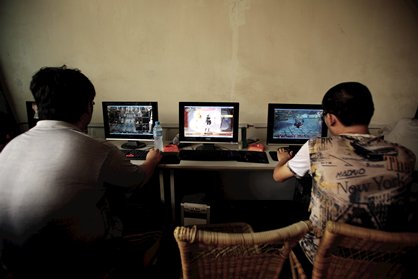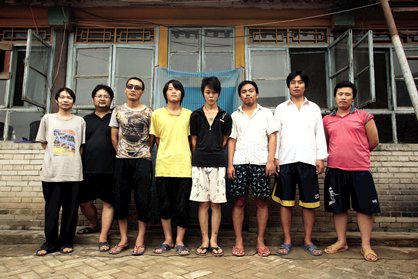All that glitters: A gold farming report
What's life really like for some of the world's most reviled gamers?
For millions of MMO players, there was no love lost. In fact, last July’s widespread report, that the Chinese government had banned gold farming, was met with giddy rapture.
For years, gold farmers had been the worker ants in games like World of Warcraft and EverQuest, trading virtual loot for real-world profit. Gamers harrumphed, publishers shook their fists, but where there is demand there is always supply and gold farmers continued to sell MMO swag for profit. An estimated 85% of these entrepreneurs operate in China. So, upon hearing the news, many MMO denizens breathed a sigh of relief. Gold farming was dead. Or was it?

Above: Hard at work
Not at all, says the University of Manchester’s Professor Richard Heeks, an expert on virtual economies. “The reason the Chinese government hasn’t banned gold farming is because it doesn’t want to ban gold farming. It wanted to clamp down on the use of online payment systems as alternative currencies to the Yuan. We have to wait and see if its policy statements become policy reality. But gold farming continues.”
Gold farming remains an economic phenomenon. Around a million farmers work in China alone, generating $1 billion every year. Across the Far East, workers hunch over PCs, repeating tasks to win items or loot, then sell their spoils to customers. An AT-RT in Star Wars Galaxies, for example, nets a gold farmer around $10/£6. In RuneScape, 5 million gold shifts for $20/£12. Other gold farmers power-level characters for customers: in WoW, you can pay $50/£30 to have a level 40 character dinged to 60.

Above: The Shopping Channel’s new presenter is a real charmer
For his upcoming documentary,Play Money, Anthony Gilmore visited gold farming operations across China. One business, located in Changsha, has more than 300 employees and plans to increase its workforce to 500. Gilmore also visited a power-leveling firm in Nanjing and a smaller family run studio in Beijing. According to myth, gold farmers work in sweatshops: the kind of hellholes where Third World toddlers knit Gucci handbags. This is not really the case.
Sign up to the GamesRadar+ Newsletter
Weekly digests, tales from the communities you love, and more
“As this industry has grown over the years, the working conditions have improved,” says Gilmore. “For the most part, comparative to similar service industry jobs, the workshops offer decent salaries, often with bonuses, and the work is safe. There is no need to worry about getting a hand caught in a sewing machine. Smaller workshops generally house workers on the premises. Some may also offer between one and three meals per day. The larger the company the more standard work conditions you find.
“Many gold farmers are pleased with their work because of job security, good salary, and friendly environment. The majority of power-levelers love their work because they get paid to play videogames. These workers are gamers first and foremost, just like the customers they support.”

Above: Beijing power-levelers on a break from MMO work
Gold farming isn’t just an Eastern business. In its heyday, IGE(Internet Gaming Entertainment) made millions from trading virtual swag, and it still shifts gold from MMOs like Age of Conan and Warhammer Online. Alongside offices in China, IGE operates out of Los Angeles and Miami. “IGE’s employees and service providers earn above average pay, work in clean, air-conditioned facilities, and receive benefits including gym sponsorships, transportation and other allowances, medical plans, annual bonuses, to deliver high employee morale and productivity,” says IGE’s Raoul Blautzik.


